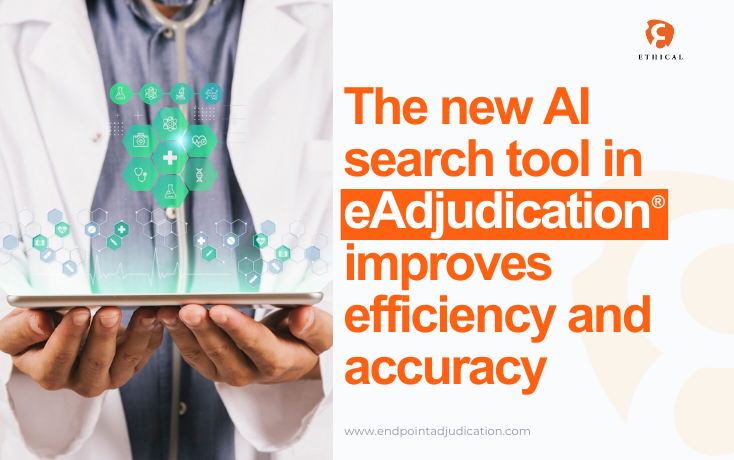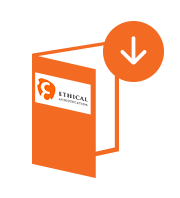Ethical’s secure AI search tool leverages advanced algorithms and machine learning capabilities to analyze vast amounts of data quickly. By reducing the time and effort required to find relevant information, the tool allows users to focus on more critical tasks and improves the overall quality of the endpoint adjudication.
Do you ever find yourself wasting valuable time sifting through your files in search of specific documents? Or perhaps you are sometimes unsure of where to locate important information and struggling to double-check crucial details? These are common pain points experienced by individuals involved in the clinical endpoint adjudication process, whether endpoint adjudication coordinators or members of the endpoint adjudication committee.
To address these challenges, Ethical has integrated a secure and user-friendly AI search tool into the eAdjudication® platform. The tool is easily accessed from the platform menu bar. As with any typical search engine, the user types the question in a dedicated field, an answer is provided almost instantly, and the conversation can continue. The tool searches exclusively within the study documents such as protocols, charters or event documents that are securely stored in a database hosted on Ethical's servers. For scanned documents, the search engine uses the Optical Character Recognition technology. The tool does not search elsewhere on the web in order to not compromise the answer reliability.
Accurate an precise results
The AI search engine developed by Ethical is built on a robust generative AI foundation, employing advanced natural language processing to grasp the context and significance behind user queries. This approach allows the search tool to deliver results that go beyond mere keyword matching, offering contextually relevant information. Users benefit from quick and easy access to the most pertinent data, enhancing their search experience with accuracy and relevance.
Feedback mechanism for continuous improvement
Furthermore, the AI search tool integrated in eAdjudication® can learn and improve over time. By incorporating a feedback mechanism, the tool analyzes user interactions and feedback, ensuring even better accuracy and efficiency over time.
Easy access to contextually relevant documents
An important benefit of the search tool is the easy access to the most relevant source documents in the specific context of the search. This is achieved by providing a direct link to the source document(s) as part of the answer. A disclaimer warns the user to check the relevance of the document version and encourages them to check the content in person before providing their feedback.
The availability of a comprehensive set of relevant and up-to-date source documents for the search tool throughout the length of the study is planned ahead of the platform implementation phase with the client.
Process efficiency, traceability
By improving search efficiency without compromising security, Ethical’s eAdjudication AI search tool empowers endpoint adjudication committee members to make informed decisions faster and more confidently, enhancing the overall efficiency and quality of the process.
The full history of the search is saved in the system to anticipate potential auditors’ requests.
Users training
While AI excels at understanding and interpreting natural language, AI search tools may struggle with queries that involve nuanced or abstract concepts. As part of the GxP-compliant training on eAdjudication®, users are trained to best use the tool in order to achieve accurate and relevant search results, and to provide feedback in order to facilitate the search tool continuous learning.
In conclusion, the arduous task of locating and accessing relevant information during the endpoint adjudication process is significantly streamlined in Ethical's eAdjudication® platform with the addition of the AI search tool. Available for the coordinator and adjudicator roles, the new AI search tool enhances the efficiency and quality of the endpoint adjudication process while safeguarding data security and GxP compliance.




